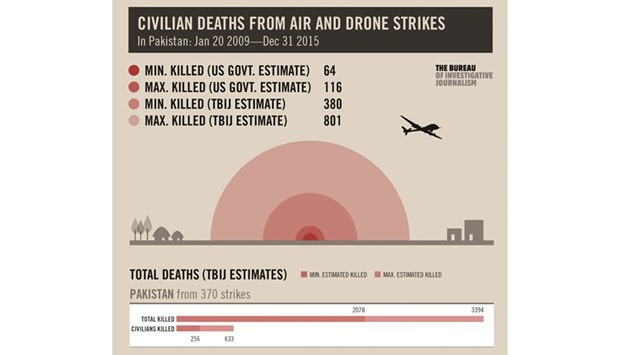Pakistan on Friday reiterated a call to immediately nix the controversial CIA drone programme that it sees as a violation of “territorial integrity and sovereignty of states”.
Dr Maleeha Lodhi, the country’s permanent representative to United Nations, drove home at the General Assembly that counter-terrorism measures violating territorial integrity and sovereignty of states could be counterproductive while also fuelling violent extremism.
Pakistan is top of the pile where casualties - a significantly high number of civilians amongst them - from drone strikes are concerned.
Lodhi’s reaction followed Obama administration’s decision to release information about a civilian casualty count - a departure from its longstanding unwillingness to even recognise any such occurrence - during the period 2009-2015.
The administration released the data - three years after it first promised to do so - estimating that between 64-116 civilians apart from 2,372-2,581 militants (in 473 strikes) were eliminated as a result of the unmanned predators’ target-shooting.
The tally, it said, included those outside the war zones although no country was specified.
Independent watchdogs, non-governmental organisations and rights groups weren’t taken in by the administration’s math; they could hardly be faulted since not only does the count appear significantly smaller than what has been reported in the international media and accounted for by these dedicated scrutinisers - despite the obvious difficulty in obtaining an accurate scorecard thanks to the very secretive nature of the programme and accessibility - the continuing ambiguity was akin to that proverbial inverted finger in terms of probity.
The Bureau of Investigative Journalism (BIJ), an independent not-for-profit organisation based in London that pursues research, investigations, reporting and analysis, in collaboration with renowned global media houses, and which boasts critical acclaim on the covert drone programme, puts the civilian death count as a result of the strikes in Yemen, Libya, Pakistan and Somalia at 380-801.
“While any disclosure of information about the (US) government’s targeted-killing policies is welcome,” Jameel Jaffer, deputy legal director of the American Civil Liberties Union, told the BIJ, “the government should be releasing information about every strike - the date of the strike, the location, the numbers of casualties, and the civilian or combatant status of those casualties.
“The public has a right to know who the government is killing - and if the government doesn’t know who it’s killing, the public should know that,” he said.
Jennifer Gibson, staff attorney at Reprieve, a London-based human rights organisation that works with the international media to help the most vulnerable on the planet and raise awareness about the unlawful CIA drone strikes, felt Washington may have missed the boat.
“For three years now, President Obama has been promising to shed light on the CIA’s covert drone programme. Today, he had a golden opportunity to do just that. Instead, he chose to do the opposite. He published numbers that are hundreds lower than even the lowest estimates by independent organisations.
The only thing those numbers tell us is that this administration simply doesn’t know who it has killed,” Gibson said.
“Back in 2011, it claimed to have killed “only 60” civilians. Does it really expect us to believe that it has killed only four more civilians since then, despite taking hundreds more strikes? The most glaring absence from this announcement are the names and faces of those civilians that have been killed,” she said.
In Pakistan, drone strikes have been a sticking point in relations with the US.
The sovereignty breach is seen as a betrayal for all the monumental losses that the country has suffered for fronting the US-led global war-on-terror.
Pakistan has lost more than 60,000 lives, including civilians and military; and $120bn in material terms, according to unofficial but widely quoted figures, since it was coerced to join the war 15 years ago.
Talking of drone strikes alone, according to the BIJ, there have been 424 strikes in Pakistan in this time - a remarkable 373 under Obama, who was handed a Nobel Peace Prize less than nine months into office to his own surprise - with more than 2,500 killed, including 350 civilians.
This includes 69 children in one single strike on a seminary in Chenegai (Bajaur region) in 2006 alone!
The contrast with former president George W Bush - with a pronounced war-mongering repute and under whom the drone programme was initiated - couldn’t be starker.
Where Bush authorised 51 strikes in seven years, Obama ratcheted it up to 373 - 128 in 2010 alone - in a still unfinished eight-year presidency, according to BIJ.
Despite the surge, the civilian casualty percentage remains low for Obama - 5.6% to Bush’s eight.
When citing the “illegality” of the action, critics, in particular, point to the noncombatants running the covert programme.
The indiscriminate use of force has led to large-scale civilian casualties with the profound disadvantage that it breeds extremism and anti-Americanism - when innocents die and are dismissed as “collateral” - against the intended purpose of quelling it.
Nevertheless, the executive decision by President Obama to institutionalise a reporting process on the drone programme - following pressure from foreign governments and rights organisations/groups - for the next commander-in-chief suggests there may be some light at the end of the tunnel.
The willingness to recognise that some sort of transparency is in order, is welcome - as noted by Naureen Shah, director of Amnesty International USA’s Security and Human Rights Program.
“(The) disclosure is a crucial shift away from the Obama Administration’s longstanding policy of concealing information about civilians killed in drone strikes,” she said in a statement.
“It is a vital step in dismantling the dangerous precedent of a global, secret killing programme. President Obama’s willingness to comprehensively assess the impact of (the) drone programme and to apologise and compensate victims, will ultimately influence his human rights legacy and set a clear benchmark for the next administration and the one after that,” Shah noted.
“This is not the end of the public conversation on US drone strikes, but just the beginning,” she enthused, in what many hope, will find a more receptive ear in the White House.
- The writer is Community editor.


